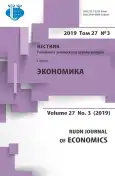Technical efficiency of smallholder malt barley producers in Tiyo district (Ethiopia)
- Authors: Bekele Y.1, Regasa G.1
-
Affiliations:
- Jimma University
- Issue: Vol 27, No 3 (2019)
- Pages: 525-535
- Section: INDUSTRIAL ORGANIZATION MARKETS
- URL: https://journal-vniispk.ru/2313-2329/article/view/342865
- DOI: https://doi.org/10.22363/2313-2329-2019-27-3-525-535
- ID: 342865
Cite item
Full Text
Abstract
About the authors
Yadeta Bekele
Jimma University
Email: yadeta11@gmail.com
lecturer and researcher, College of Agriculture and Veterinary Medicine P.O. Box 307, Cluj-Napoca, Federal Democratic Republic of Ethiopia
Guta Regasa
Jimma University
Email: jiineguta2014@gmail.com
student, College of Agriculture and Veterinary Medicine P.O. Box 307, Cluj-Napoca, Federal Democratic Republic of Ethiopia
References
- Assefa A., Jema H., Bosena T. (2016). Technical Efficiency of Smallholder Wheat Production in Soro District of Hadiya Zone, Southern Ethiopia. M.Sc. thesis presented to the School of Graduate Studies of Haramaya University, Ethiopia.
- Awol A.E., (2014). Economic Efficiency of Rain-Fed Wheat Producing Farmer’s in North Eastern Ethiopia: The Case of Albuko District. M.Sc. thesis presented to the School of Graduate Studies of Haramaya University, Ethiopia.
- CSA (Central Statistical Agency). (2013). Agricultural sample survey 2012/2013 (2005 E.C.): Volume I. Report on area and production of major crops (Private peasant holdings, Meher season). Statistical Bulletin 532. Central Statistical Agency, Addis Ababa, Ethiopia.
- CSA (Central Statistical Agency). (2016). Agricultural sample survey report on area, production and farm management practice of Belg season crops for private peasant holdings (p. 5)
- CSA (Central Statistics Agency). (2014). Annual Statistics Bulletin: Addis Ababa, Ethiopia.
- Deme S., Matthews N., Henning, J. (2015). Analysis of factors affecting technical efficiency of smallholder maize farmers in Ethiopia. Conference Paper.
- Fantu N., Berhane G., Asrat S., Getachew G., Taffesse A.S., Hoddinott J., (2011). Sources of inefficiency and growth in agricultural output in subsistence agriculture: a stochastic frontier analysis.
- FAO (Food and Agricultural Organization). (2011). Food balance sheets database. http://faostat.fao.org (accessed: 09.09.2015).
- FAO (Food and Agricultural Organization). (2014). Analysis of Price Incentives for Malt barley in Ethiopia for the time period 2005-2012. www.fao.org/fileadmin/templates/ .../Ethiopia/.../ethiopia_Malt barley_web.pd (accessed: 15.05.2015).
- Gosa A., Jema H. (2016). Economic Efficiency of Sorghum Production for Smallholder Farmers in Eastern Ethiopia: The Case of Habro District. Journal of Economics and Sustainable Development, 7.
- Hika W.F., Jema H. (2016). Economic Efficiency of Sesame Production in Babogambel District of West Wollega Zone, Oromia Region, Ethiopia. MSc thesis submitted to the School of Graduate Studies of Haramaya University.
- Jema Haji. (2008). Economic efficiency and marketing performance of vegetable production in the eastern and central parts of Ethiopia. Doctoral Dissertation, Swedish University of Agricultural Sciences Uppsala.
- Kifle D., Moti J., Belaineh L. (2017). Economic efficiency of smallholder farmers in maize production in Bako Tibe district, Ethiopia. Development Country Studies, 7(2).
- Mesay Yami, Tesfaye Solomon, Bedada Begna, Fekadu Fufa, Tolesa Alemu, Dawit Alemu. (2013). Sources of technical inefficiency of smallholder malt barley farmers in selected water-logged areas of Ethiopia: A translog production function approach. African Journal of Agricultural Research, 8(29), 3930-3940.
- Musa H., Lemma Z., Endrias G. (2015). Measuring technical, economic and allocative efficiency of maize production in subsistence farming: Evidence from the Central Rift Valley of Ethiopia. Applied Studies in Agribusiness and Commerce, 9(3), 63-74.
- Mustefa Bati. (2017). Economic efficiency in barely production: The case of Chole district, East Arsi zone, Oromia National Regional State, Ethiopia. MSc thesis, Haramaya University, Haramaya, Ethiopia.
- Ntabakirabose G. (2017). An economic analysis of the factors influencing maize productivity and efficiency in Gatsibo district, Rwanda. M.Sc. thesis presented to the School of Graduate Studies of Jomo Kenyatta University, Rwanda.
- Saulos J.C. (2015). A survey on technical, allocative, and economic efficiency of maize production using the parametric stochastic frontier production function. African Journal of Agricultural Economics and Rural Development, 3(6), 237-245.
- Sisay Debebe, Jema Haji, Degye Goshu, Abdi-Khalil Endriss. (2015). Technical, allocative, and economic efficiencies among smallholder maize farmers in southwestern Ethiopia: Parametric approach. Journal of Development and Agricultural Economics, 7(8): 282-291.
- Solomon Bizuayehu. (2014). Technical efficiency of major crops in Ethiopia. M.Sc. Thesis, Oslo University, Oslo, Norway.
- Tiruneh W.G., Geta E. (2016). Technical efficiency of smallholder wheat farmers: The case of Welmera district, Central Oromia, Ethiopia. Journal of Development and Agricultural Economics, 8(2), 39-51
- UNDP (United Nations development programme). (2018). Ethiopia's progress to warding eradicating poverty. Paper to be presented to the inter-agency group meeting on the implementation of the third United Nations decade for the eradication of poverty (2018-2027). Addis Abeba, Ethiopia
- WB (World Bank). (2007). Project Performance Assessment Report: Seed System Development Project and National Fertilizer Sector project. Report No. 40124
- WFP (World Food Program). (2010). Summary of Food Security and Vulnerability in Selected Cities of Ethiopia
- Wondimagegn M. (2010). Analysis of Technical Efficiency of Wheat Production on Vertisol: The case of Enebsie Sar Mieir woreda in East Gojjam. M.Sc. Thesis presented to the School of Graduate Studies of Haramaya University, Ethiopia
- World Bank. (2013). World Development Report. World Bank, Washington, D.C, USA
Supplementary files









